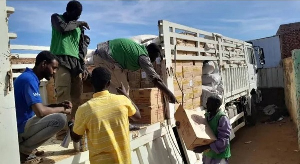The Government is to introduce an import system that allows importers to pay duties on their wares before they arrived in the country.
Known as the GC Net Customs Mechanism, the concept is to facilitate quick and efficient customs and excise procedures at the various ports and make Ghanaians and investors feel more comfortable and willing to come and do business.
The mechanism, which is in its final stage of development, would require importers to pay for and submit documents on their wares to the Customs, Excise and Preventive Service (CEPS) before they arrived.
"This would ensure that importers can clear their goods within a maximum of 48 hours of their submitting the counterpart papers to the port authorities," Mr Ferdinand Ayim of the Ministry of Information and Presidential Affairs told a press conference in Accra on Tuesday.
Mr Stephen Asamoah-Boateng, Co-ordinator National Economic Dialogue and Kwabena Antwi of the Ghana Investment Promotion Centre (GIPC) addressed the press briefing that was at the instance of the Homecoming Secretariat. It was to deliver a summary report of the outcome of the Summit, which was aimed at bringing Ghanaians abroad home to discuss ways of helping the motherland.
Mr Asamoah-Boateg noted that the problem of clearing goods at the ports had been identified as a major impediment not only to Ghanaians living abroad but also to investors and potential investors desiring to make Ghana their business destination.
He said the secretariat had had several meetings with CEPS on the mode, scope and duration of clearing goods, which "we all agreed has to be shortened and made much easier than at present".
Mr Asamoah-Boateng said with the passing of Legislative Instrument 1691, granting dual citizenship to Ghanaians abroad, "our compatriots abroad will feel needed and be part of the efforts to move this country forward".
Presenting a half-year status report as at December 2001, Mr Asamoah-Boateng said another secretariat, the non-resident Ghanaians Secretariat, had been established and located within the Flagstaff House to liaise with all Ministries, Departments and Agencies (MDA) to ensure implementation of the recommendations.
"So far, we have worked to prepare a comprehensive data on Ghanaian professionals abroad. Those in North America and Europe have completed preparing data on medical and accounting professionals," Mr Asamoah-Boateng said.
"Other areas such as teaching, consultancy and the entertainment industry are being prepared. We can easily identify about one million of our compatriots whose resource and goodwill the country would enjoy on a regular and constant basis."
On the systematic build-up of a core of highly trained Ghanaians abroad, who would return to build the nation, he said, "the implementation of the recommendations of the Summit will be done in phases."
"For now we are looking at the mass of Ghanaian professionals already out there and to see how their talents and skills could be tapped. Thereafter, we can take a look at creating that reputable resource base of young Ghanaian professionals."
He said post-Homecoming Summit non-resident Ghanaian joint venture investment in the last quarter of 2001, amounted to 30.42 million dollars. This was 30 per cent of the 97.3 million dollars of foreign direct investment that came into the country.
Mr Asamoah-Boateng said the NRG secretariat was working with the Bank of Ghana (BoG), Ministry of Finance and SEM Financial Services to issue a certificate of deposit, set up a NRG Development Fund and establish a privatisation fund.
"An account will soon be opened at Bank of Ghana to facilitate the process of transfer, making monitoring easier and enhancing the confidence of NRG's in the management of funds," he said.
Click to view details



Business News of Wednesday, 20 March 2002
Source:
















